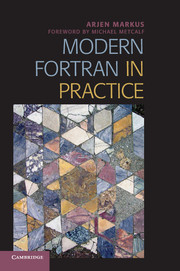Book contents
- Frontmatter
- Contents
- Foreword
- Preface
- 1 Introduction to Modern Fortran
- 2 Array-Valued Functions
- 3 Mathematical Abstractions
- 4 Memory Management
- 5 An Interface Problem
- 6 Interfacing to C: SQLite As an Example
- 7 Graphics, GUIs, and the Internet
- 8 Unit Testing
- 9 Code Reviews
- 10 Robust Implementation of Several Simple Algorithms
- 11 Object-Oriented Programming
- 12 Parallel Programming
- A Tools for Development and Maintenance
- B Caveats
- C Trademarks
- Bibliography
- Index
Preface
Published online by Cambridge University Press: 05 July 2012
- Frontmatter
- Contents
- Foreword
- Preface
- 1 Introduction to Modern Fortran
- 2 Array-Valued Functions
- 3 Mathematical Abstractions
- 4 Memory Management
- 5 An Interface Problem
- 6 Interfacing to C: SQLite As an Example
- 7 Graphics, GUIs, and the Internet
- 8 Unit Testing
- 9 Code Reviews
- 10 Robust Implementation of Several Simple Algorithms
- 11 Object-Oriented Programming
- 12 Parallel Programming
- A Tools for Development and Maintenance
- B Caveats
- C Trademarks
- Bibliography
- Index
Summary
I have been programming in Fortran for more than 25 years, first in FORTRAN IV and somewhat later in FORTRAN 77. In the last decade of the 20th century, I attended, together with a number of colleagues, a course on Fortran 90, given by the late Jan van Oosterwijk at the Technical University of Delft. It was also around this time that I came to know the comp.lang.fortran newsgroup, and I have learned a lot by participating in that friendly community.
In a way, I am a typical Fortran programmer. My background is physics and I learned the task of programming partly during my study, but mostly on the job. In other ways, I am not because I took a fancy to the more esoteric possibilities of programming in general and sought means to apply them in Fortran. I also began writing articles for the ACM Fortran Forum. These articles are the groundwork for this book.
This book will not teach you how to program in Fortran. There are plenty of books dedicated to that ([22], [65]). Instead, the purpose of this book is to show how modern Fortran can be used for modern programming problems, such as how techniques made popular in the world of object-oriented languages like C++ and Java fit neatly into Fortran as it exists today. It even shows some techniques for solving certain programming problems that are not easily achieved in these languages.
- Type
- Chapter
- Information
- Modern Fortran in Practice , pp. xv - xviPublisher: Cambridge University PressPrint publication year: 2012



